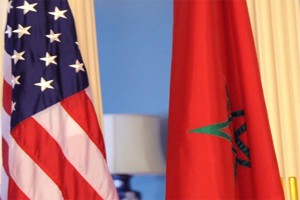- Washington “follows with interest” Morocco’s openness onto Africa (John Kerry)Posted 11 years ago
- The trial of South African Paralympic champion Oscar Pistorius opened in Pretoria on Monday.Posted 11 years ago
- USA welcomes efforts of King Mohammed VI in MaliPosted 11 years ago
- Egypt’s population reaches 94 millionPosted 11 years ago
- Mugabe celebrates his 90thPosted 11 years ago
- Moroccan Monarch to Build a Perinatal Clinic in BamakoPosted 11 years ago
- King Mohammed VI handed a donation of bovine semen for the benefit of Malian breeders.Posted 11 years ago
- Moroccan King’s strategic tour to Africa: Strengthening the will of pan African Solidarity and stimulating the south-south cooperation mechanisms over the continentPosted 12 years ago
- Senior al-Qaida leader killed in AlgeriaPosted 12 years ago
- Libya: The trial of former Prime Minister al-Baghdadi AliPosted 12 years ago
A controversial outcome of the US position on the building of confidence in North Africa region
 Morocco on Tuesday warned of “harmful consequences” for regional stability from US-backed plans to broaden the mandate of the UN mission in the disputed Western Sahara to probe human rights practices.
Morocco on Tuesday warned of “harmful consequences” for regional stability from US-backed plans to broaden the mandate of the UN mission in the disputed Western Sahara to probe human rights practices.
The initiative, to be decided by the 15-nation Security Council this month, has set off furious reactions by Morocco, which recovered its sovereignty after the pull out the former Spanish colony over the territory in 1975.
In a sign of the potential diplomatic fallout, a US Defence official confirmed reports that this month’s so-called African Lion annual joint military exercises between the United State and Morocco had been cancelled.
More than 1,400 US military personnel and 900 members of the Moroccan armed forces were due to take part in the military cooperation exercise.
Morocco first voiced its condemnation of “certain initiatives which could deform the mandate of MINURSO,” in a royal statement carried by the official news agency following a government meeting ordered by King Mohammed VI last Monday.
Communications Minister Mustapha Khalfi on Tuesday reiterated Rabat’s “categorical rejection” of plans to allow the United Nations to investigate Human Rights practices in the territory.
Such a “biased and unilateral initiative” is “an attack on the national sovereignty” of the country and would have “harmful consequences for the stability of the region,” Mr Khalfi told reporters in the Moroccan capital.
“It is unjustified because it fails to take into consideration the collective efforts made by Morocco to promote human rights,” he said, adding that Rabat was “counting on the prudence of the Security Council members.”
“The urgency of the regional situation compels us… to uphold the spirit of compromise… to achieve a just, lasting and mutually acceptable political solution,” the minister said, while condemning an attempted “exploitation of human rights.”
Some experts evaluated such US initiative as in a big disagreement with the vision of the UN secretary General who stressed in his report last week that “The rise of instability and insecurity in and around the Sahel requires an urgent settlement of this long-standing dispute… and that All governments consulted raised serious concerns over the risk that the fighting in Mali could spill over into neighboring countries and contribute to radicalizing the Western Saharan refugee camps”.
Morocco is worried furthermore that this sudden change in US foreign policy towards the issue of Western Sahara might be used by Polisario and by the Algerian antagonistic Propaganda machine to generate an environment of insecurity and troubles in the area under the pretext of Human Right file.
Professor Eskender Mellet commented that: “the context in which the US proposal to call for expanding MINURSO functions raises a number of questions on geopolitical arguments behind such initiative. A move which does not consider the tense environment resulted from the war in Mali, and the controversial outcome of such position on the building of confidence in North Africa region. “American diplomats and intelligence agencies are well informed how these resolutions if adopted would please Algerian ambitions to harass Moroccan’s stability”. The Cypriot analyst added, that “ such US diplomacy rush in making such change on US foreign policy reflects that the fundamental spirit of the resolution was prepared outside the diplomatic “Room” , and the Kennedy Center – known for his hostility to Morocco- might be the one behind .
American diplomats who wish to be quoted anonymously added that if it is proven that the Robert F. Kennedy Center for Justice and Human Rights was behind such changes, this means that the decision-making mechanisms in the U.S. started to enter a new course where fundamental institutions of US foreign policy making are not associated, and furthermore, civil societies became able to penetrate the diplomatic machine easily.




